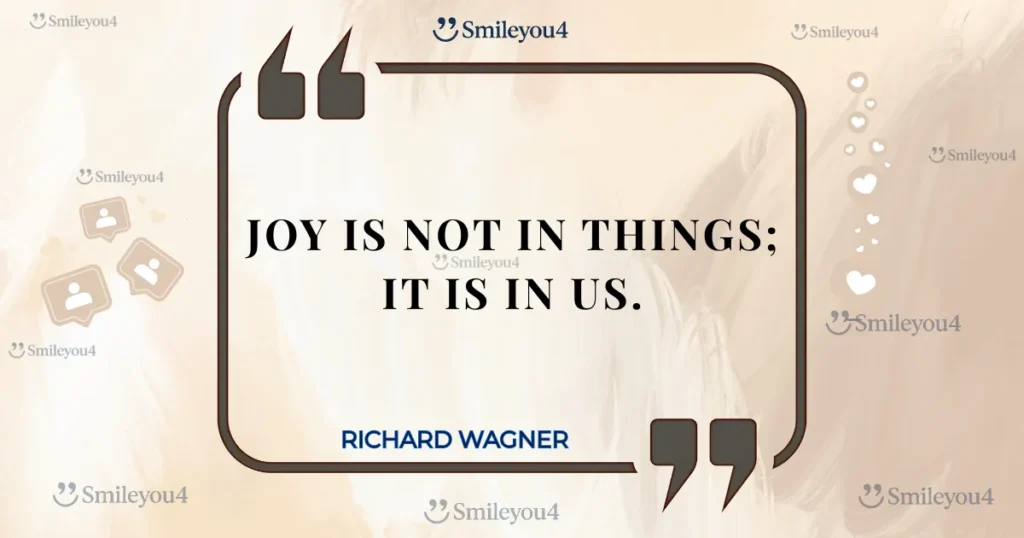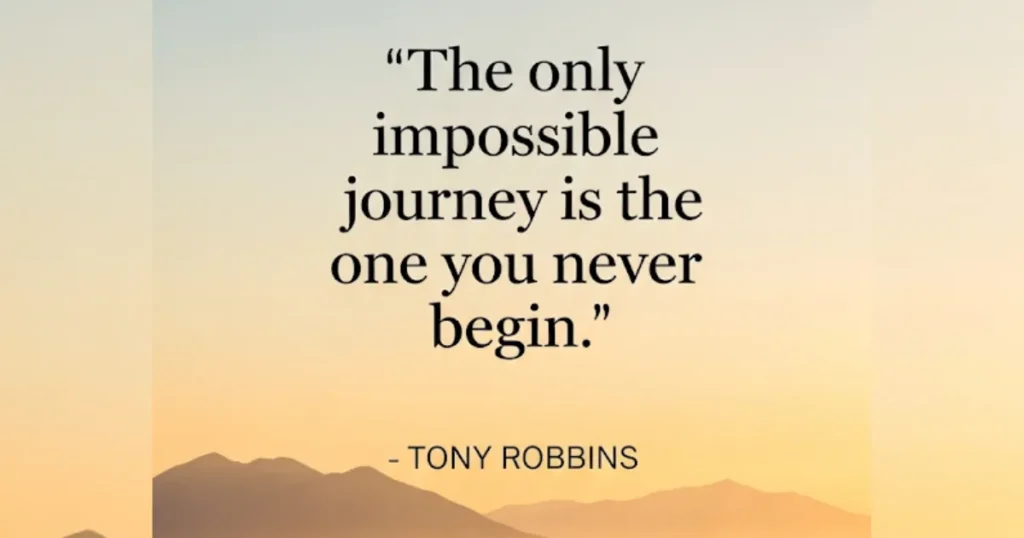What if the secret to genuine happiness has been hiding inside you all along? While we chase external rewards—the perfect job, dream home, or ideal relationship—composer Richard Wagner understood something profound: “Joy is not in things; it is in us.” This joy is in us Richard Wagner quote isn’t just beautiful philosophy—it’s a life-changing truth that can transform how you approach every single day.

You’ve probably experienced both sides of this truth. Remember that expensive purchase that thrilled you for a week before losing its magic? Or that promotion you worked toward for months, only to discover it didn’t bring the lasting satisfaction you expected? Now contrast that with moments of pure joy that cost nothing—laughing with friends, watching a sunset, or achieving a personal breakthrough. These experiences prove what Wagner knew: joy is in us, not in our possessions.
Today, we’ll explore how this timeless wisdom can revolutionize your relationship with happiness. You’ll discover practical ways to cultivate the inner joy that no external circumstance can steal and learn why understanding that Richard Wagner quote joy is in us might be the most important life lesson you’ll ever embrace.
Understanding Richard Wagner’s Revolutionary Truth About Joy
The Composer Who Found Beauty in Internal Harmony
When Richard Wagner declared that joy is in us, he spoke from deep personal experience as both an artist and a human being navigating life’s complexities. As one of history’s greatest composers, Wagner understood that true creative power—and genuine happiness—comes from within, not from external acclaim or material success.
Wagner’s musical genius emerged not from perfect circumstances but from his ability to tap into internal sources of inspiration and joy. His operas, which continue to move audiences worldwide, were born from his understanding that the most profound beauty originates in the human spirit, not in external rewards.
This Richard Wagner quote teaches us something revolutionary: you don’t need to acquire joy from the outside world because you already possess it. Like a musician who must find the melody within before expressing it outwardly, you must discover the happiness that already exists in your inner landscape.
Why Wagner’s Simple Truth Changes Everything
“Joy is not in things; it is in us.” Let’s examine why these eight words contain the power to transform your entire approach to happiness:
- “Joy is not in things” frees you from the endless chase for external satisfaction
- “It is in us” reveals that happiness is your natural inheritance, not something to be earned
- The complete message shifts your focus from acquiring to discovering what you already possess
This insight works because it eliminates the happiness treadmill—that exhausting cycle of seeking the next thing that will finally make you happy. When you truly understand that joy is in us, you stop waiting for permission from circumstances to feel good.
The Science Behind Inner Joy and Lasting Happiness
How Your Brain Creates Happiness From Within
Modern neuroscience confirms what Richard Wagner intuitively understood about internal joy. Research shows that sustainable happiness comes from inner processes, not external circumstances. Studies reveal that only 10% of happiness comes from life circumstances, while 50% is determined by genetics and 40% by our thoughts and actions.
Mental benefits of inner-focused joy:
- Increased production of serotonin and dopamine through gratitude and mindfulness practices
- Enhanced prefrontal cortex activity, improving emotional regulation and decision-making
- Strengthened neural pathways associated with contentment and peace
- Reduced stress hormones when you stop depending on external validation
Physical advantages:
- Lower blood pressure and improved cardiovascular health
- Stronger immune system function
- Better sleep quality and increased energy levels
- Reduced inflammation throughout the body
This scientific backing proves that the joy is in us Richard Wagner quote principle isn’t just artistic philosophy—it’s a practical strategy supported by decades of happiness research.
The Hedonic Treadmill and Why External Things Fail Us
Psychologists have identified the “hedonic treadmill”—our tendency to quickly return to baseline happiness levels despite positive or negative events. This explains why that new car, promotion, or relationship initially brings joy but then becomes normal, leaving us seeking the next external fix.
When you embrace Wagner’s truth that joy is in us, you step off this exhausting treadmill. You discover that:
- Temporary pleasures can be enjoyed without depending on them for happiness
- Setbacks don’t destroy your peace because your joy has deeper roots
- Contentment becomes your default state rather than something to achieve
- External successes enhance but don’t create your fundamental well-being
Real-Life Champions of Inner Joy
Maya Angelou: Finding Light Within Darkness
Maya Angelou’s life perfectly demonstrates that joy is in us regardless of external circumstances. Despite facing childhood trauma, racism, and personal struggles, she consistently found ways to access inner happiness and share it with others through her writing and speaking.
Her approach to cultivating inner joy included:
- Practicing daily gratitude for simple blessings like morning coffee and children’s laughter
- Finding meaning and growth opportunities within difficult experiences
- Using creative expression to connect with the joy that lived in her spirit
- Choosing forgiveness and compassion as pathways to inner peace
Angelou proved that when you understand Richard Wagner quote wisdom about inner joy, you become unshakeable. External circumstances may challenge you, but they cannot destroy the happiness that springs from within.
Viktor Frankl: Discovering Meaning in Unimaginable Circumstances
Holocaust survivor Viktor Frankl’s experience validates Wagner’s insight that joy is in us even during humanity’s darkest moments. In concentration camps, Frankl discovered that while his captors could control his external circumstances, they couldn’t touch his inner freedom and capacity for finding meaning.
His inner joy practices included:
- Finding purpose in helping fellow prisoners maintain hope and sanity
- Using his imagination to connect with memories of love and beauty
- Choosing his attitude and response regardless of external treatment
- Discovering that serving something greater than himself created unshakeable fulfillment
Frankl’s story proves that the Richard Wagner principle works even in extreme circumstances. When you cultivate inner joy, you become resilient in ways that external security could never provide.
Oprah Winfrey: Building an Empire From Inner Abundance
Oprah’s transformation from childhood poverty to becoming one of the world’s most influential media personalities shows how understanding that joy is in us creates both personal fulfillment and external success. Her happiness didn’t come from achieving wealth and fame—it came from nurturing her inner spirit first.
Her inner joy cultivation strategies include:
- Starting each day with gratitude journaling to connect with internal abundance
- Using meditation and spiritual practices to access deeper sources of peace
- Finding genuine pleasure in helping others discover their own potential
- Choosing work that aligned with her values rather than just pursuing profit
Oprah demonstrates that when you prioritize the joy is in us Richard Wagner quote wisdom, external success often follows naturally—but more importantly, you remain happy whether it does or not.
Practical Steps to Cultivate Your Inner Joy
Start Your Morning by Connecting With Internal Happiness
Transform your mornings by applying Wagner’s truth that joy is in us from the moment you wake up:
Inner joy morning rituals:
- Before checking your phone, take three deep breaths and smile at the gift of a new day
- Practice gratitude by noticing three things you appreciate about your life right now
- Set an intention to look for moments of inner peace throughout your day
- Engage in gentle movement like stretching while appreciating your body’s capabilities
Mindset preparation:
- Remind yourself that your happiness doesn’t depend on what happens today
- Focus on how you want to feel rather than just what you want to accomplish
- Connect with your core values and let them guide your choices
- Remember that Richard Wagner understood joy as your birthright, not something to earn
Develop Daily Practices That Nurture Internal Happiness
Your inner joy grows stronger through consistent cultivation. When you remember that joy is in us, you can develop practices that water this internal garden:
Mindfulness and presence:
- Take regular breaks to notice what’s good in your current moment
- Practice eating one meal per day with full attention and appreciation
- Spend a few minutes daily in nature, connecting with beauty that costs nothing
- Listen to music that moves your soul and let it awaken your inner happiness
Creative expression:
- Write in a journal about experiences that brought you genuine joy
- Engage in art, music, or crafts that allow your spirit to express itself
- Dance alone in your living room when your favorite song comes on
- Share your gifts and talents with others, regardless of your skill level
Connection and service:
- Call someone you care about just to hear their voice and share your love
- Look for small ways to help others throughout your day
- Practice genuine compliments and expressions of appreciation
- Volunteer for causes that align with your values and bring meaning to your life
Build Your Personal Inner Joy Toolkit
Create specific strategies that help you access the truth that joy is in us Richard Wagner quote teaches:
Emergency joy boosters:
- Keep a list of activities that instantly connect you with inner happiness
- Have photos easily accessible that make you smile from your heart
- Practice breathing exercises that calm your nervous system and restore peace
- Use affirmations that remind you of your inherent worth and capacity for joy
Weekly joy enhancement:
- Schedule regular time for activities that feed your soul, not just your obligations
- Reflect on moments when you felt genuinely happy and identify common themes
- Experiment with new ways of expressing creativity and playfulness
- Connect with people who appreciate and encourage your authentic self
Overcoming Common Obstacles to Inner Joy
Moving Beyond External Validation Addiction
Many people struggle with Wagner’s truth that joy is in us because they’ve become addicted to external approval and achievement. Breaking this pattern requires gentle persistence and self-compassion:
Strategies for internal validation:
- Celebrate your efforts and progress, not just your outcomes
- Notice when you’re seeking approval and redirect attention to your own values
- Practice saying “I’m proud of myself” for small daily accomplishments
- Remember that others’ opinions of you don’t determine your worth or happiness
Building inner confidence:
- Keep a daily record of choices you made that aligned with your authentic self
- Trust your intuition more often, even in small decisions
- Practice expressing your genuine thoughts and feelings with safe people
- Recognize that Richard Wagner quote wisdom means your joy doesn’t require anyone else’s permission
Dealing With Materialism and Consumer Culture
Our society constantly promotes the myth that happiness comes from acquiring things. To embrace that joy is in us, you need strategies for resisting this external programming:
Mindful consumption practices:
- Before making purchases, ask yourself if you’re buying the item or hoping to buy happiness
- Practice appreciating what you already own rather than always wanting more
- Find free activities that bring you genuine pleasure and fulfill


